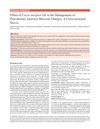2 citations,
September 2021 in “Anais Brasileiros de Dermatologia” Increased sunscreen use may be linked to frontal fibrosing alopecia in Hispanic females.
 18 citations,
June 2019 in “Clinical research in dermatology”
18 citations,
June 2019 in “Clinical research in dermatology” Acne can't be cured but can be managed with treatments like benzoyl peroxide and diet changes; it's costly and can lead to scarring and mental health issues.
September 2016 in “Oncology times” Breast cancer survivors often face body image and sexual health issues, needing ongoing support and open communication with healthcare providers.
 34 citations,
September 1992 in “Journal of the American Academy of Dermatology”
34 citations,
September 1992 in “Journal of the American Academy of Dermatology” Dermatologists need to know about cosmetics to help patients with skin issues and recommend safe products.
 March 2024 in “Journal of skin and stem cell”
March 2024 in “Journal of skin and stem cell” Social media often spreads unreliable skincare advice, leading to potential skin problems, especially in teens.
 7 citations,
November 2013 in “Pediatrics in Review”
7 citations,
November 2013 in “Pediatrics in Review” Acne is a chronic skin condition not caused by poor hygiene or diet, and it requires long-term treatment and patient education.
 2 citations,
December 2021 in “World journal of dentistry”
2 citations,
December 2021 in “World journal of dentistry” Coconut oil effectively treats sore gums from new dentures and is safe, affordable, and heals quickly.
 19 citations,
February 2015 in “Contact dermatitis”
19 citations,
February 2015 in “Contact dermatitis” Avoiding certain fragrances improved the man's skin condition.
 March 2024 in “International journal of nanomedicine”
March 2024 in “International journal of nanomedicine” Polymeric nanohydrogels show potential for skin drug delivery but have concerns like toxicity and regulatory hurdles.
 January 2023 in “International Journal for Research in Applied Science and Engineering Technology”
January 2023 in “International Journal for Research in Applied Science and Engineering Technology” Herbs like Tea Tree Oil and Aloe Vera could be safer, more conditioning antidandruff alternatives to synthetic products.
8 citations,
August 2012 in “Clinical, cosmetic and investigational dermatology” Doublebase gel hydrates skin better and is preferred by most users over Aqueous cream.
 50 citations,
February 2022 in “Nanomaterials”
50 citations,
February 2022 in “Nanomaterials” Nanomaterials show promise in improving wound healing but require more research on their potential toxicity.
 January 1987 in “Side effects of drugs annual”
January 1987 in “Side effects of drugs annual” Some cosmetics and dermatological drugs can cause allergic reactions and side effects, like skin irritation and systemic issues.
 September 2023 in “Clinical, cosmetic and investigational dermatology”
September 2023 in “Clinical, cosmetic and investigational dermatology” SLFC can improve scalp health and reduce sensitive scalp symptoms.
 1 citations,
June 2010 in “Expert Review of Dermatology”
1 citations,
June 2010 in “Expert Review of Dermatology” Covers common skin issues in kids, their diagnosis, treatment, and need for specialist care.
 78 citations,
February 2011 in “Canadian Medical Association Journal”
78 citations,
February 2011 in “Canadian Medical Association Journal” Acne treatment varies, with topical and systemic therapies effective, and more research needed on treatment order and long-term effects.
 May 2017 in “Journal of The American Academy of Dermatology”
May 2017 in “Journal of The American Academy of Dermatology” PLAU and SerpinB2 affect cell death differently in various forms of leprosy and could be targets for new treatments.
 520 citations,
January 2017 in “AIMS biophysics”
520 citations,
January 2017 in “AIMS biophysics” Photobiomodulation therapy using red and near-infrared light can reduce inflammation and aid in healing various conditions.
 2 citations,
March 2019 in “European Journal of Dermatology”
2 citations,
March 2019 in “European Journal of Dermatology” Pharmacy-sold shampoos tend to have fewer allergens compared to those sold in other stores.
 March 2001 in “International Journal of Cosmetic Surgery and Aesthetic Dermatology”
March 2001 in “International Journal of Cosmetic Surgery and Aesthetic Dermatology” The document covers books on cosmetic surgery and skin care, discussing legal and ethical issues, wound healing, the overlap of cosmetics and drugs, and detailed plastic surgery techniques.
 November 2024 in “Frontiers in Medicine”
November 2024 in “Frontiers in Medicine” Cirrhosis affects quality of life with various symptoms, requiring a holistic, multidisciplinary approach for management.
20 citations,
September 2015 in “Pediatric Annals” PCOS in teen girls should be managed with lifestyle changes and sometimes medication to improve symptoms and health.
 January 2019 in “Springer eBooks”
January 2019 in “Springer eBooks” Acne can appear or persist in adulthood due to hormonal changes, external factors, or substance use, and requires appropriate treatment.
 1 citations,
October 2023 in “Romanian Journal of Morphology and Embryology”
1 citations,
October 2023 in “Romanian Journal of Morphology and Embryology” COVID-19 can cause various skin issues, but long-term skin problems are rare.
7 citations,
February 2019 in “Veterinary medicine and science” An American Bully with a genetic skin condition improved significantly with specific topical treatments.
 July 2022 in “Research Square (Research Square)”
July 2022 in “Research Square (Research Square)” Lower PPARγ levels and specific gene variations are linked to more severe Frontal Fibrosing Alopecia.
 17 citations,
January 2011 in “Indian journal of dermatology, venereology, and leprology”
17 citations,
January 2011 in “Indian journal of dermatology, venereology, and leprology” A rare genetic skin condition usually affecting males was found in a 9-year-old girl.
 53 citations,
September 2017 in “BMJ Open”
53 citations,
September 2017 in “BMJ Open” Nearly all elderly nursing home residents had a skin disease, with dry skin being the most common.
 2 citations,
November 2014
2 citations,
November 2014 Common cosmetic dermatology techniques improve skin damaged by the sun and aging.
227 citations,
April 2020 in “Cell” More precise, personalized therapies are needed for autoimmune diseases.























